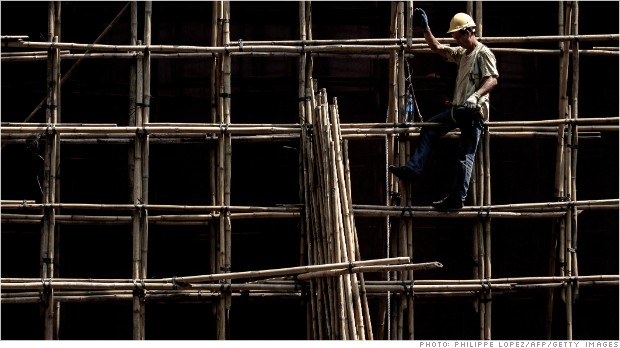Easy Credit Dries Up, Choking Growth in China

A farmer at a housing project in Shenmu, China, that has been stalled by financial problems.
By KEITH BRADSHER
Published: August 15, 2013 120 Comments
SHENMU, China — As the Chinese economy boomed, few cities soared faster or higher than Shenmu, a community of nearly 500,000 in northwestern China.
Adam Dean for The New York Times
In Shenmu, China, stores have closed, construction projects have been halted and protests have erupted because an economic slowdown has led to increasingly widespread defaults on loans.

The New York Times
Shenmu, a city of 500,000, is plagued by economic ills.
Readers' Comments
Share your thoughts.
Top luxury clothing stores in this city's downtown were recording as much as $500,000 a day in sales. Tables at the best restaurants had to be reserved weeks in advance. The new Fortune Garden Club for the city's business elite made headlines by paying $1 million for a king-size mahogany bed, to be used by members and their companions.
But a painful credit crisis is now spreading across Shenmu and cities nearby, as thousands of businesses have closed, fleets of BMWs and Audis have been repossessed and street protests have erupted.
Now the leading purveyors of Western fashions are deserted, monthly sales at restaurants are down as much as 97 percent and the marble entrance to the Fortune Garden Club is shuttered. All but one of the city's car dealerships have failed.
The owner of the city's largest jewelry store was detained by the authorities a week ago after creditors found him secretly packing millions of dollars' worth of gold and jewels into cases and accused him of preparing to flee the city without settling his debts. A top restaurant closed a day earlier, and its owner left town, as have the founder of the Fortune Garden and many other executives.
"It's an economic crisis just like the United States has had; just like it," said Wang Ting, an operator of an illegal casino in Fugu, near Shenmu. "There's no cash, everyone stays home without a job, there's no way the economy can recover."
Shenmu, and nearby cities like Ordos and Fugu, are at the leading edge of broader troubles that are beginning to afflict the entire Chinese economy. Across China, growth has slowed. With the slowdown have come rising defaults on loans made outside the conventional banking system, chronic overcapacity in many industries like coal mining and steel production and, in particularly troubled cities like Shenmu, a sharp decline in previously debt-fueled prices for real estate and other assets.
The cracks are showing in many sizable cities like coastal Wenzhou, where informal lending, a big part of so-called shadow banking, has dominated for a quarter-century. Cities with economies linked to commodities with falling prices have also been affected, as more people have defaulted on loans. The biggest, most economically diverse metropolitan areas like Beijing and Shanghai seem considerably less affected, but also have many small and medium-size businesses that depend on informal lending.
Lending has collapsed here in northern Shaanxi Province, where it was particularly speculative and frenzied, and where the local coal industry has also been crippled by steeply falling prices.
As some borrowers began defaulting early this year, worried lenders in the informal sector raised interest rates for small and medium-size businesses, previously 25 to 40 percent a year, to as much as 125 percent a year. The increase set off a much broader wave of defaults in recent weeks, as owners found themselves unable to repay billions of dollars in bad debts, many of them handwritten and hard to enforce in court.
"Almost no one will give you a loan," said a construction executive who gave only his surname, Xie, as he stood next to his white Toyota Land Cruiser outside a project that had been halted.
Although changes are being slowly introduced, state-owned banks have long been allowed to lend only at low, regulated rates barely above the inflation rate, with the total value of loans controlled by quarterly quotas. All over China, these loans go overwhelmingly to large state-owned businesses, government officials and politically connected individuals, who then relend the money at much higher interest rates to small and medium-size businesses in the private sector that need money to grow.
Liu Linfei, a government official from nearby Yulin, stood on a Shenmu street corner in a T-shirt and shorts on a recent weekend afternoon, outside two high-rise hotels where construction had been stopped just before the windows could be installed. He said he had borrowed 600,000 renminbi, almost $100,000, from a bank shortly before the collapse, at an interest rate of 4.1 percent a year.
Mr. Liu then lent the cash to moneylenders here at an interest rate of 10.4 percent, planning to pocket the difference.
The moneylenders who borrowed from Mr. Liu defaulted, and now he is struggling to repay the bank. "I'm not going to lose my house, because I'm repaying it little by little with money I borrow from my relatives," he said.
The Chinese are finding it harder to repay loans because the economy is slowing. Most analyses of China's economy look only at the real economic growth rate, around 7.5 percent this year. But for companies' sales and profits, which determine their ability to repay debts, what really matters is the nominal growth rate, which is real economic growth plus inflation.
Private sector businesses could afford to borrow at double-digit interest rates because nominal growth of 16 to 23 percent a year from 2004 through 2011 exceeded the rates. But nominal growth slowed last year to 9.8 percent and fell again in the first half of this year, to an annual pace of 8.8 percent.
At the same time, overinvestment led to overcapacity. Dozens of new mines opened around Shenmu in the last decade and older mines expanded. But demand has grown much more slowly than expected for electricity and steel, the two main users of coal.
Coal prices have dropped by half in the last three years as a result. Now, out of 90 mines near Shenmu, practically the only ones still operating are nine that are state-owned and do not need to show a profit.
The popping of the real estate bubble has been the most serious blow to the local economy. Real estate prices had soared in cities across China. In Shenmu, 1,200-square-foot apartments that sold for less than $20,000 a decade ago reached $330,000 by last winter.
Local real estate brokers say that they are advising sellers to avoid price cuts of more than 10 percent. But local business owners who buy and sell apartments say that deals are now being done for as little as $115,000 for a 1,200-square-foot apartment, a decline of 65 percent.
Public discontent is fueling street protests. Several thousand residents turned out in mid-July for a demonstration in the expensively paved square across the street from city hall, demanding that municipal officials revive the stalled economy. More recently, a smaller group of migrant workers protested, demanding that the local government pay their back wages after construction was halted on a row of high-rise apartment buildings.
Yet a Shenmu merchant, who insisted on anonymity because of local tensions, said that he had a lot of sympathy for officials, who even put up banners on city streets last year warning residents of the dangers of participating in informal lending schemes.
"It's a national problem, it's not a local issue," he said.
| Reply via web post | Reply to sender | Reply to group | Start a New Topic | Messages in this topic (1) |
to Subscribe via email :
batavia-news-subscribe@yahoogroups.com
----------------------------------------
VISIT Batavia News Blog
http://batavia-news-networks.blogspot.com/
----------------------------
You could be Earning Instant Cash Deposits
in the Next 30 Minutes
No harm to try - Please Click
http://tinyurl.com/bimagroup
--------------



No comments:
Post a Comment